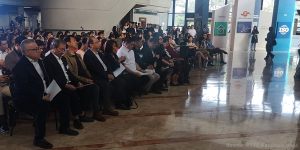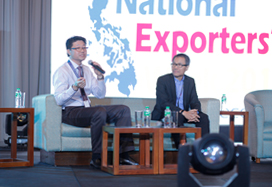 The Philippine Trade Training Center (PTTC) recently embraced its new role as the hub for Filipino innovators to produce “smarter” entrepreneurs through the soft launch of the Philippine Global MSME Academy. Moreover, a signing of a Memorandum of Agreement (MOA) between and among multi-stakeholder collaborators including the Department of Trade and Industry (DTI) and PTTC, Lead-More Development Inc., and other industry partners for the Integrated Center for Entrepreneurship (ICE) project was also done on 27 February 2019.
The Philippine Trade Training Center (PTTC) recently embraced its new role as the hub for Filipino innovators to produce “smarter” entrepreneurs through the soft launch of the Philippine Global MSME Academy. Moreover, a signing of a Memorandum of Agreement (MOA) between and among multi-stakeholder collaborators including the Department of Trade and Industry (DTI) and PTTC, Lead-More Development Inc., and other industry partners for the Integrated Center for Entrepreneurship (ICE) project was also done on 27 February 2019.
The PTTC’s new brand as the home to the Philippines’ Global MSMEs Academy (GMEA) will have a bigger role in developing the country’s entrepreneurship programs as well as honing the skills of the country’s entrepreneurs and would-be entrepreneurs. The GMEA aims to promote more “globally competitive MSMEs that are regionally integrated, resilient, sustainable and innovative, thereby performing as key drivers of inclusive Philippine economic growth”.
For its part in the GMEA, PTTC has aligned its Entrepreneurship training programs for the youth, women and Overseas Filipino Workers (OFWs) in tandem with other institutions providing capacity building programs for the said sectors.
Meanwhile, DTI Secretary Ramon Lopez said he wants to transform the country’s MSMEs from mere buy and sell traders into innovators who can come up with new products and services that will address local as well as regional and even global needs. The GMEA, he claimed will be the innovation centers and local hubs where aspiring and established entrepreneurs can learn from mentors and seek financing for their businesses. He added that DTI will team up with agencies like DepEd to strengthen the curriculum of elementary and high school students to reinforce science, technology and entrepreneurship and TESDA to develop more skills training for students.
On the other hand, the PTTC was also made the home and administrator of the ASEAN SME Academy, thereby making the Philippines as the first country to become the administrator of the ASEAN SME Academy through the Department of Trade and Industry. As the new academy administrator, the PTTC shall facilitate online forums that will link MSMEs in the Philippines to SMEs in Southeast Asia to share experiences on common issues in business and trade, identify best practices, and benchmark in the best practices of ASEAN member economies.
Further, the ASEAN SME Academy is a one-stop multi-platform online learning and information resource for Southeast Asian SMEs with support from USAID, ASEAN Coordinating Committee on MSME and the US-ASEAN Business Council (US-ABC).
At present, there are 50 training courses on finance and accounting management, marketing, operation, technology, and trade and logistics from Fortune 500 companies and members of the US-ABC for Competitive SMEs are being offered. In addition, the Academy contains around 350 relevant links to business information and access to directory of service providers to whom SMEs can reach out for financial advice, corporate programs and networking.



 “Since the inception of the industry-government-academe linkage, there is now greater participation and partnerships between companies and universities in the implementation of this reform at ground level.” This was reported by Mr. Sergio R. Ortiz-Luis, Jr., president of the Philippine Exporters Confederation (PHILEXPORT) and Vice-Chair of the Export Development Council (EDC), during the recently concluded 8th National Education Forum.
“Since the inception of the industry-government-academe linkage, there is now greater participation and partnerships between companies and universities in the implementation of this reform at ground level.” This was reported by Mr. Sergio R. Ortiz-Luis, Jr., president of the Philippine Exporters Confederation (PHILEXPORT) and Vice-Chair of the Export Development Council (EDC), during the recently concluded 8th National Education Forum.